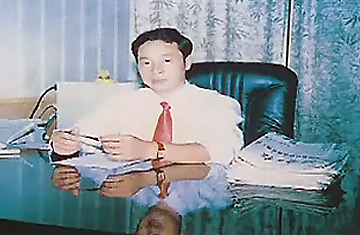
Yuan Hongwei, accused of counterfeiting products produced by ABRO, an American industrial adhesive manufacturer.
ABRO Industries learned early on that it was facing an audacious challenger. In 2003 Timothy Demarais, vice president of the South Bend, Indiana-based industrial adhesive manufacturer, says he walked into the Canton Trade Fair in Guangzhou, China, and found that his company's product line — and his company's identity itself — had been knocked off by a Chinese firm called Hunan Magic Power, also known as Magpow. When Demarais attempted to have the imposter kicked out, he says, Hunan Magic Power chairman Yuan Hongwei produced documentation that he claimed showed his company had the right to use the trademark ABRO. He had even copied ABRO's labeling, including one sample card with a photo of a woman applying epoxy to a bicycle. The woman, it turned out, was Demarais' wife. After Demarais pulled out another photo of his wife from his wallet, the trade fair officials booted Hunan Magic Power. "How blatant can you be when you steal my wife's picture for your card?" asks Demarais.
While intellectual property rights battles are often seen as the stuff of pirated DVDs and fake designer handbags, a manufacturer of comparatively mundane adhesives is now waging one of the most pitched and public fights over counterfeiting. And ABRO, a private company with two dozen employees, has learned just how tough the fight can be. It has spent four years and more than $4 million in legal fees battling Hunan Magic Power. Last fall, ABRO finally thought it was making headway when police in the U.K. arrested Yuan at Heathrow airport on a warrant stemming from a criminal counterfeiting charge in Louisiana. A London court was to hear an extradition request from the U.S. on Jan. 10. But Yuan, who had posted $200,000 bail and surrendered two passports, somehow managed to flee the country and is now back home in Hunan. "Clearly this is very disappointing for us both on a practical level and also from a standpoint of respect for the rule of law," says ABRO's CEO Peter Baranay.
While ABRO says Yuan is a bold fraudster, in China many see him as a victim of U.S. bullying. More than 10,000 put their names on an online petition supporting him, and his flight from justice has only boosted his standing as a folk hero. Yuan says he came up with the ABRO product line on his own, although the U.S. company predates his. In an open letter published on a Chinese website last week Yuan said he would only accept a trial before a Chinese court. He added that he had been tricked into flying to the U.K., and that he was owed the bail money he forfeited because his name was misspelled on a court document. He also wanted to thank his many fans. "I most want to say thank you to all levels of the motherland's government and the people for the loving concern, help and support you gave me during my period of misfortune in London," he wrote. (A call to Yuan's cell phone was answered by a woman who said that he was undergoing treatment for a heart condition.)
On Chinese blogs, ABRO is increasingly being labeled the villain in the saga, and the company's Chinese attorneys have been called traitors. "Thanks to America and Britain, and with the help from the traitors, Chinese people were left in the dark and really thought Magic Power and Yuan Hongwei violated the law," reads one posting. Baranay estimates that ABRO, which does more than $100 million a year in sales in 150 countries, loses as much as $12 million to $15 million in business annually due to Hunan Magic counterfeiting. ABRO has succeeded in having counterfeit products destroyed in Cameroon, Nigeria and Ghana. The company has also won trademark infringement cases against Hunan Magic in Guangzhou and Beijing, although both are being appealed. "The Chinese legal system has been very supportive of our case," Baranay says. "We've been tarred and feathered, but we're not going to abandon China. We sell in China and we manufacture some of our products in China." But despite government support at the national level, Baranay says local authorities in Yuan's home of Hunan haven't gone after him. "Good gracious, he employs people, he pays taxes — that's a powerful incentive to local people to turn a blind eye."
In 2005, Hunan Magic allegedly shipped $22,000 worth of products to Livingston Parish, Lousiana, sparking the charges that led to Yuan's arrest in London. Under Louisiana laws, among the toughest in the U.S. against counterfeiting, he could face millions in fines and up to five years in jail. But the Chinese government has no extradition treaty with the U.S., meaning Yuan would likely only be sent back to face those charges by a third nation. While Yuan's recent experience seems to indicate he won't likely be risking any trips abroad anytime soon, ABRO plans to continue their pursuit of him. "We're not going away," says Baranay. And Yuan seems determined not to go away either.
